Foreign jihadis playing a big role in Syria’s Idlib
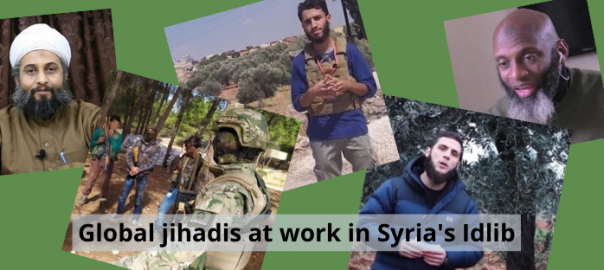
The thousands of highly motivated foreign fighters at all ranks of the fighting forces that control Syria’s Idlib enclave pose a particular challenge to policymakers worldwide trying to deal with the bitter fighting in the enclave and the humanitarian crisis that has resulted from it. (Many of these foreigners have also brought their children with them, as I’d noted here.)
Col. Myles Caggins, the spokesperson for the U.S. military group that has been fighting ISIS in northeastern Syria and Iraq since 2014, is one of the few Western officials who have openly acknowledged the challenge posed by the foreign fighters in Idlib. Most Western leaders and pundits have avoided any discussion of the issue at all, talking instead only about the humanitarian emergency in Idlib—and doing so in a way that ignores the often harsh control that foreign and Syrian extremists exercise over the civilians in the enclave and the aid flows into it.
This makes the blogging of a young Iraqi-British man called Aymenn Jawad al-Tamimi particularly valuable. On his blog, Tamimi presents numerous interviews with key foreign jihadis—currently, mainly those operating in Idlib, though earlier he had also interviewed numerous foreign ISIS fighters and organizers in eastern Syria and Iraq. On his English/Arabic/French blog, Tamimi shares a wealth of detail from what these foreign fighters tell him.
Since February 13– and during some periods of very intense fighting in Idlib– Tamimi has recorded interviews with seven foreign jihadis who play significant roles in the public and administrative life of the enclave. All of them work more or less closely with the al-Qaeda-affiliated (and genocidal) Hay’at Tahrir al-Sham (HTS) faction that has controlled most of the enclave since 2017. They had all come to Syria to join the “jihad” there during the early years of the armed insurgency that erupted against the Syrian government in 2011. They have thus now been in the country for several years and have attained positions of some responsibility in the HTS-led administration of Idlib.
Three of the seven interviewees were Egyptians. The other four came from the United States, France, Germany, and Chechnya. Some described their role as working within the “Shari’a court” system that HTS has established in Idlib. Some described their role as “doing jihad through media work”. One, Ali Shishani (“Ali the Chechen”), talked openly about the work his military-training and -support organization has played fighting on the front-lines. Nearly all of them seemed confident expressing detailed appraisals of the strategic situation and challenges within the enclave.
I’m guessing Tamimi conducted most of these interviews by phone or via a messaging app. Here is a quick digest of what we can gain from reading them. (The photos are all from Tamimi’s blog.)
Interview with Bilal Abdul Kareem
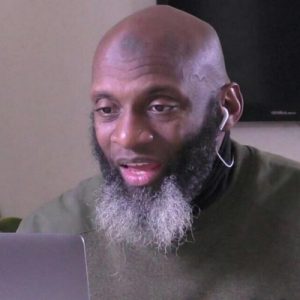
Bilal Abdul Kareem, who grew up in New York, is one of the more notorious of the pro-HTS propagandists.
Tamimi wrote on his blog February 13:
Of the various muhajireen (i.e. foreigners who have come to the territories held by the insurgent groups in Syria), Bilal Abdul Kareem- an American convert to Islam- stands out as perhaps the most well-known working in the realm of media, running an outlet called On the Ground News that provides live coverage of events in northwest Syria (Idlib and its environs), interviews with a variety of people in that region, and general social media updates from other parts of Syria and the world…
As Bilal and I both agreed in a conversation prior to this interview, working in the media realm means talking to and interviewing, if one can, people whose viewpoints one may not agree with or dislike. Thus, while Bilal has his own clear perspective on events (i.e. he is supportive of the armed fight against the Syrian government and believes it is a cause of the Ummah- the global Muslim community), that is not the same as being a ‘propagandist’ for a particular faction… I found Bilal to be polite and engaging: far preferable to a lot of the social media noise created by distant observers who have not been on the ground.
In the interview, Abdul Kareem expounds at great length on the humanitarian and political situation inside Idlib, but he doesn’t say anything particularly new or interesting. At the end, though, he opines that the U.S. government’s “Caesar” Act, that placed harsh sanctions on the Syrian government, has also had harsh effects on the residents of Idlib.
Interview with Sheikh Abu al-Yaqdhan al-Masri
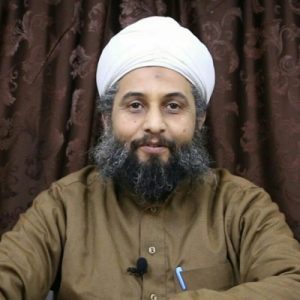 Abu al-Yaqdhan is a 48-year-old cleric, originally from Egypt, who described his trajectory in Syria in these terms:
Abu al-Yaqdhan is a 48-year-old cleric, originally from Egypt, who described his trajectory in Syria in these terms:
I migrated to al-Sham [Syria] in 2013 and my work has been connected with the Shari’i aspect in its different forms. I joined Harakat Ahrar al-Sham al-Islamiya when I arrived to Syria as I worked with them in the Shari’i sector in the city of Aleppo for around four years then I joined the merger of Syrian factions in Hay’at Tahrir al-Sham after the fall of Aleppo city and I remained with Hay’at Tahrir al-Sham for two years then I have been working in da’wa in the military sectors in an independent sense until the present time.
He says of the Idlib enclave: “In this small portion of the liberated Syrian north the best of the mujahideen, of the muhajireen, and displaced and the inhabitants of this area who reject the rule of Bashar al-Assad have gathered.” Asked about the deteriorating military situation in the enclave, he says: “the solution lies in the factions returning to the military option and true interest in military force and not relying on international understandings.”
He seems to have a fairly other-worldly view of the balance of forces on the ground in Syria:
The one who considers the current situation sees a collapsed regime in Damascus, for the Assad regime is suffering from military break-up and a great economic crisis and security breakdown and administrative deterioration, while we in Idlib possess human and material resources that enable us by the grace and force of God to reach Damascus, and we are only lacking fear of God (Almighty and Exalted is He), giving the bow to the one who knows how to shape it and activating those powers.
Interview with Talha al-Masir (Abu Shu’aib al-Masri)
Tamimi notes that al-Masir, an Egyptian, is just one of many non-Syrian “muhajir” men who have traveled to Syria to help run the shari’acourt system that HTS has set up there. (This interview, like the next one described, carries no portrait of the interviewee. It is possible that, in line with extremist-jihadi injunctions against idolatry, the interviewee chose not to supply one?)
In the interview, Masir says:
I came to Syria at the end of 2012, and I worked in the Shari’i field connected with the jihad like Shari’i courses, the judiciary, studies in ‘Ilm and inciting to jihad, while participating with the mujahideen in their blessed course.
I participated with Ahrar al-Sham then Hay’at Tahrir al-Sham and then as an independent. Then in the recent time the focus of the field activity has become on encouraging sincere efforts that work to reform the general situation of the jihad and the Syrian revolution in order to resist the campaign of the enemy that is assaulting the liberated areas.
In the interview, Masir calls the Syrian government by the very sectarian name “the Nusayri enemy.” He calls for “Moving from merely defending to defending and carefully planned attack” and says, “whoso is able to stand with the mujahideen of al-Sham [Syria] by his sword, tongue or wealth, let him take the initiative to do that, for the believer is to the believer like the edifice strengthening each other.”
Explanation of HTS’s principles by another Egyptian cleric in HTS
In this post, Tamimi provides a translation of a document recently released by Abu al-Fatah al-Farghali, an Egyptian cleric who remains inside HTS. It affirms HTS’s inviolable principles (thawabit) that will not be compromised upon and cannot be violated by any HTS member. Tamimi notes that this document, “is in keeping with earlier HTS teachings such as the rejection of democracy (cf. here) and secularism.”
Tamimi also provides here his own interesting comparison between HTS and the Taliban in Afghanistan. HTS, he notes,
mirrors the Taliban in being a militant Islamic movement that wants to be taken seriously by international actors, giving supposed assurances to them that its territories will not be used as a launchpad for ‘external operations‘, and having as the first ideal goal the establishment of an Islamic government over the entirety of the main country of its operation. However, these points do not entirely exclude the prospect of transnational jihad in the long-run.
(This chimes with my own commentary on HTS’s current “prettification” campaign, as described here.)
The French media activist: Interview with Moussa al-Hassan
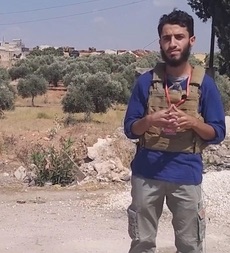 Tamimi introduces this interview by noting that, “there are multiple people of foreign origin working in the realm of media in the insurgent-held areas of Idlib… One of these people is Moussa al-Hassan, who describes himself as an independent French reporter and is of the social media outlet called Nouvelles En Direct Du Terrain (‘Live News From The Field’).” In the interview, Hassan expressed his frustration with the strategic ineptitude of the HTS-led rebel forces:
Tamimi introduces this interview by noting that, “there are multiple people of foreign origin working in the realm of media in the insurgent-held areas of Idlib… One of these people is Moussa al-Hassan, who describes himself as an independent French reporter and is of the social media outlet called Nouvelles En Direct Du Terrain (‘Live News From The Field’).” In the interview, Hassan expressed his frustration with the strategic ineptitude of the HTS-led rebel forces:
They have not known how to adopt an effective military strategy that can allow them to stop the offensives. Their military capabilities are largely inferior to the armies. Therefore they should have applied a guerrilla approach on several fronts instead of confronting the army directly, as is the case until today…
The rebels have never before had an attack force as is the case today. The number of combatants is far more elevated. The factions possess a lot of financial means. The innovations of armoured vehicles as well as remote-guided drones: all this is new for the revolution. But despite that, they are unable to resist. The military and political errors of the rebels have unfortunately allowed the regime to reach the gates of Idlib.
Hassan noted (correctly) that, “Since the start of the revolution, Turkey has been an important factor for the rebels. It is the only country that has directly supported the rebellion and has accommodated more than 4 million Syrian refugees on its soil.” His view of what could end the crisis in Idlib and the rest of Syria was, “I do not think there will be a solution to this crisis if it is not through the fall of the regime of Bashar al-Assad.”
The Muhajir War Correspondent: Interview Number 2
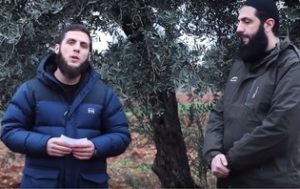
Tamimi tells us that Abdussamed Dagül is a German muhajir of Turkish origin who serves as a war correspondent in Idlib, and who has recently interviewed HTS leader Abu Muhammad Al-Jolani.
In an earlier interview with Dagül, published in July 2019, the muhajir had told Tamimi that he came to Syria in May 2014 to do media work for the jihadis. He told Tamimi a lot about the organization of the rebel forces in Idlib at that time and about the key role that Turkey played in supplying them with arms, ammunition, and heavy-weaponry support (through their surrogates.) He also talked about his experienced in earlier battles in other parts of Syria.
In his most recent (February 24) interview with Tamimi, Dagül confirmed that:
Yes of course HTS is doing the main fighting and puts in the most military strength into the defensive battle against this military offensive, but to say that only HTS is working would be unfair. NFL [the Turkish-directed “National Front for Liberation”] is putting also manpower and especially ATGM [anti-tank guided missile] strikes in which disables the enemy from moving their tanks and vehicles freely on the frontline.
Malhama Tactical: Interview
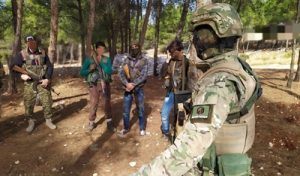 This blog-post records an interview Tamimi conducted February 26 with a man with the nom-de-guerreAli Shishani, which almost certainly means he is a Chechen. Shishani is described as the current leader of Malham Tactical, which Tamimi describes as:
This blog-post records an interview Tamimi conducted February 26 with a man with the nom-de-guerreAli Shishani, which almost certainly means he is a Chechen. Shishani is described as the current leader of Malham Tactical, which Tamimi describes as:
perhaps the best known training outfit in the northwest of Syria, providing assistance to the insurgent groups operating in Idlib and its environs. Malhama Tactical has been known to have a particularly close working relationship with Hay’at Tahrir al-Sham, the leading insurgent group in the northwest region.
Asked about his life and work in Syria, Shishani told Tamimi:
Much can be said about our life in jihad. But speaking generally, our life here is the life of independent foreign volunteers, with all its advantages and disadvantages.
Activity of Malhama Tactical (MT) is primarily aimed at increasing the combat effectiveness and tactical level of the fighting units of the Mujahideen, bringing them to a higher level and we have succeeded in it over the years of our work. It was mostly done in terms of the level of regular fighters, but not commanders – because the commanders of local Mujahideen with whom we worked do not take advanced training courses and do not accept our advice, unfortunately.
During our instructor activity, more than five thousand fighters have passed our training courses, including the well-known special unit “Red Bands” [special unit of Hay’at Tahrir al-Sham]. We provide training courses in different military fields.
Later, Shishani says that half of the members of MT are muhajirs (foreign fighters), and half are local Syrians. He also makes it very clear that MT’s work goes far behind just training:
our organization periodically played a significant role in fights on the fronts… Our team also conducted both independent and joint special operations with other groups against Assadists, including a special operation in the aerial reconnaissance base in Aleppo. Our organization also carried out artillery reconnaissance and coordination of artillery fire of local factions during the offensive campaigns against Assadists, and introduced new methods of reconnaissance and correction for local factions.
We also worked in the field of air defense and shot down an Assad regime aircraft in August 2019… As for the factions with which we work. Most of all we worked with HTS.
He described Turkey’s role as, “a helper of the Syrian people, both humanitarianly and militarily. Not everything is perfect, but we hope that Turkey will live up to the hopes of the Mujahideen and the Syrian people.” He argued that he key to success for the Syrian jihadis is that,
if all the Syrian factions unite completely both militarily and politically, having left all past differences and work together with the Turkish army, then it will be possible to fix everything and return the lost territories, and turn the tide of the entire Syrian jihad.




Geen opmerkingen:
Een reactie posten